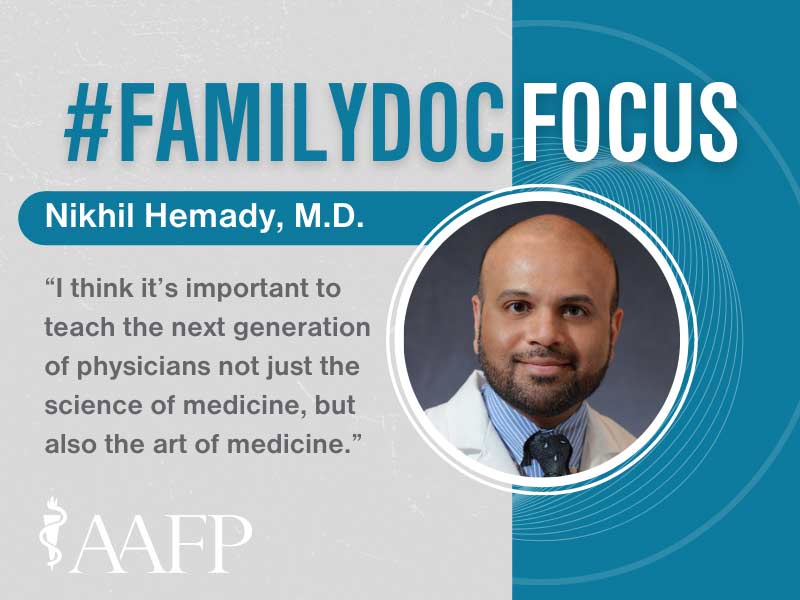Program Director Receives ACGME Accolade
April 25, 2022, 3:47 p.m. David Mitchell — After more than 25 years of practicing medicine in Michigan, Nikhil Hemady, M.D., has found the place where he belongs.

“I just love what I do,” said Hemady, who serves as program director of the family medicine residency at Pontiac General Hospital and chief medical officer of Honor Community Health’s federally qualified health center in Pontiac, Mich. “People sometimes ask me, ‘Nik, why aren’t you in one of those big hospital or university settings?’ And I say, ‘What matters the most is the people you serve and take care of and the impact you have on your local community.’ I think it’s important to teach the next generation of physicians not just the science of medicine, but also the art of medicine. We generally tend to undervalue and underestimate the work that is done by family physicians in underserved America.”
Hemady initially came to the United States from India to train at the family medicine residency program at Pontiac’s North Oakland Medical Centers. During his second year of training, (then) program director Anthony Vettraino, M.D., encouraged him to become a faculty member. Hemady stayed on as faculty after graduating from the program, serving as assistant program director, then associate program director before becoming vice chair of family medicine and eventually program director in 2007.
“Our residency program’s family medicine center is located in an area with a very high social vulnerability index, serving a community with high health care disparities,” Hemady said. “I think it’s crucial when our residents come to train with us that they see what we do for the community to address some of these disparities. The FQHC is the primary delivery model of health care in the outpatient setting for our residency team. That’s where they learn how to care for patients who are experiencing homelessness and how to care for patients who have other issues, such as lack of transportation, because all of these factors contribute to poor health outcomes.”
Hemady was recently recognized by the Accreditation Council for Graduate Medical Education with its Palmer J. Parker Courage to Teach Award for program director excellence.
“I am very passionate about what I do, and I feel that my team, including the family medicine residents, play a significant role in improving health outcomes in our community,” he said. “I’m very appreciative of the ACGME for recognizing individuals who practice and teach in a non-university, community-based setting. I think the time has come, and there’s a huge push now in family medicine, for more programs to open in underserved and rural communities. I think the COVID-19 pandemic has not only exposed issues related to health care disparities, but also taught us (as individuals) to put more trust in the health care system. Our specialty of family medicine is uniquely positioned to address many of these issues.”
Honor Community Health is planning to start another family medicine residency program in Pontiac within the next two years to increase health care access for the area’s underserved community and to “immerse residents in an experience that they seldom get in areas that don’t serve the kind of population that we serve,” Hemady said. “I think when it happens it will be a dream come true for a lot of people.”
Honor already has received a Teaching Health Center planning grant from the Health Resources and Services Administration and has named Jason Ramos, M.D., who has served as faculty at Pontiac General Hospital, to lead the new program.
As Honor’s CMO, one of Hemady’s roles would include guiding Ramos in the development of a high-quality residency program.
“We’ve got a great team of family physicians who are very interested in staying in the area and delivering primary care within our FQHC and teaching residents.”
Identifying and training residents who will stay in the state is critical to the program’s mission and future, Hemady said.
“We have to be great role models for our future generation of physicians to stay and practice in underserved America,” he said.